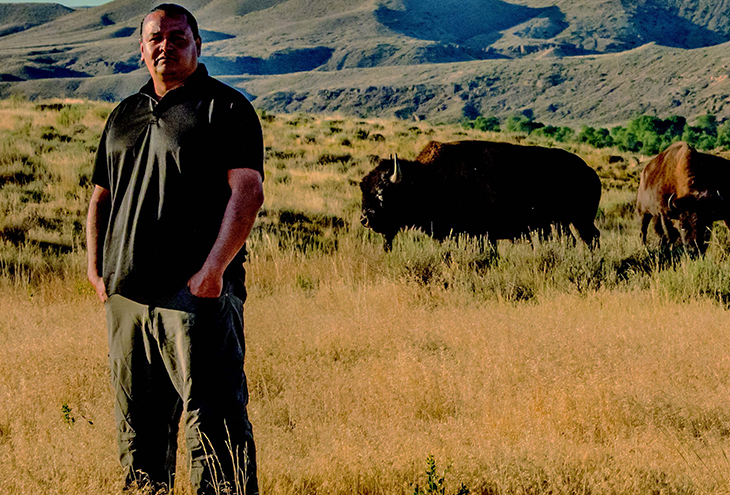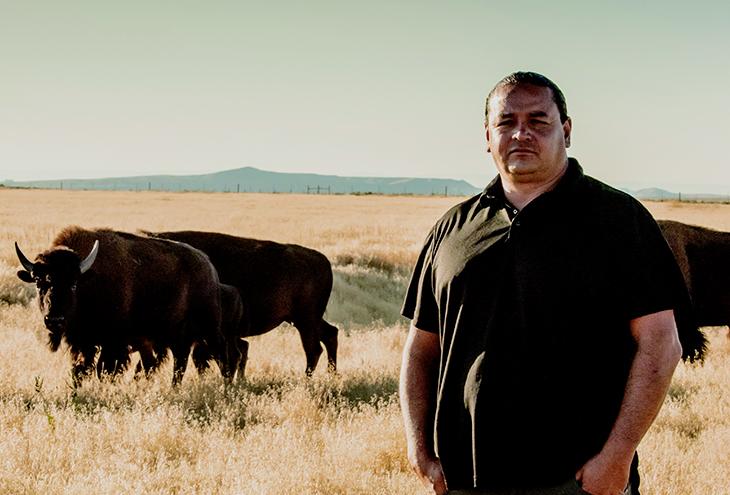Growing up on the Wind River Reservation in Fort Washakie, Wyo., Jason Baldes got an early start in wilderness exploration. As a child he would traverse the backcountry of the reservation on horseback with his father. Together they visited over 200 lakes in the Wind River Wilderness, the first nationally protected wilderness area in the United States.
These father-son adventures had a powerful impact. “My father was my greatest influence and support in seeking an education,” explains Baldes, Eastern Shoshone. And it was on a trip with his father to East Africa in 1997 that Baldes discovered the passion for bison restoration that changed the course of his life.
After witnessing the massive migration of 1.5 million African wildebeests, he was inspired to one day reintroduce buffalo to the Wind River Reservation. There were once up to 60 million buffalo in the United States, but the animals were nearly exterminated as a means of destroying a principal food source of the Native peoples of the Great Plains, Baldes explains.
With his sights set on the ambitious goal of restoring buffalo to their native grazing land, he embarked on the path to higher education. But that path was full of obstacles for Baldes. Perhaps the biggest challenge he faced was being a nontraditional student with a family to support. “Many Native people go to school as nontraditional students with families,” says Baldes, a father of four. “During this time, a
support system can be critical to success.”
That was the case for Baldes. After receiving his associate degree from Front Range Community College in Westminster, Colo., he briefly attended a series of schools — Colorado State University, Black Hills State University, and Central Wyoming College — in search of the right place for his situation. “One of the reasons I went to several different schools was the lack of Native American presence or community,” he explains. “Having that support system was very important to me.”
He finally settled on Montana State University. There, he found mentors and peers in the school’s Native community who were there for him throughout college.
Baldes graduated from Montana State with a bachelor’s degree in land resources and environmental sciences, and then went on to earn his master’s in the same field. His love for wildlife guided him through it all.
It was on a trip with his father to East Africa in 1997 that Baldes discovered the passion for bison restoration that changed the course of his life.

Early in his studies, Baldes’ interest in bison restoration became a focal point of his research. “Throughout my undergraduate and graduate programs, I focused on efforts to reintroduce bison to the Wind River Reservation,” he says. In 2011, while a graduate student at Montana State, Baldes received a fellowship from the Environmental Protection Agency to support his project. His initiative to bring buffalo back to Wind River was seen as a way to improve both ecological and community health.
In 2016, Baldes successfully returned 10 buffalo to Wind River, the culmination of years of research and hard work. “Today, cultural revitalization and ecological restoration include bison as a means to not only help Native Americans heal from the atrocities of the past, but also improve biodiversity of ecosystems,” he explains. “Many tribal communities recognize this as a valuable step to improving lives in reservation communities.”
After spending nearly 10 years getting an education, Baldes returned to the Wind River Reservation last year. “I was fortunate to arrive back home when a job opened at a local nonprofit organization,” he explains. That nonprofit, the Wind River Native Advocacy Center, soon appointed Baldes its first executive director.
Today Baldes oversees a range of projects and raises money to support the center’s mission to empower Native Americans in Wyoming through community organizing, education, research, legal advocacy, and leadership development. He is also the tribe’s bison/buffalo representative, in charge of the restoration program.
“What I find especially satisfying about my job is that I am working in my home community for the betterment of all, ecologically and culturally,” Baldes says. “I’m grateful for the opportunity to be working in this capacity — for a nonprofit and not under politicized federal, state, or tribal government agencies.” His ultimate career goal is to continue working in tribal communities on cultural and ecological restoration, leaving the land a better place.
From where he is now, Baldes can appreciate the importance of staying grounded in his culture and values. “I was advised by my elders, ‘Know who you are as a Shoshone person,’” he says. “Be strong in who you are, and be who you want to be. Don’t become something the university wants you to become. Use the opportunity to better yourself, and then come home to help your people.”











